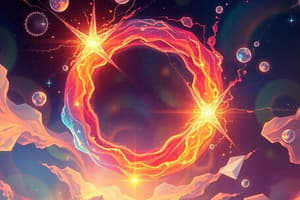Podcast
Questions and Answers
Which state of matter has the highest kinetic energy?
Which state of matter has the highest kinetic energy?
- Solid
- Plasma
- Liquid
- Gas (correct)
In a liquid state, particles are arranged far apart.
In a liquid state, particles are arranged far apart.
False (B)
What is the process called when a solid turns directly into a gas?
What is the process called when a solid turns directly into a gas?
Sublimation
Heat is __________ to break the bonds when a solid melts.
Heat is __________ to break the bonds when a solid melts.
Match the following processes with their corresponding phase changes:
Match the following processes with their corresponding phase changes:
What happens to heat during the process of condensation?
What happens to heat during the process of condensation?
Flashcards are hidden until you start studying
Study Notes
States of Matter
- Solid: Particles are tightly packed in a fixed arrangement, vibrating slightly without moving from their positions, exhibiting very low kinetic energy.
- Liquid: Particles are close together but have enough energy to slide past one another, leading to low kinetic energy.
- Gas: Particles are far apart and move randomly in all directions, possessing high kinetic energy.
Phase Changes
- Melting: The transition from solid to liquid occurs when heat is absorbed, breaking intermolecular bonds.
- Evaporation/Boiling: The change from liquid to gas also requires heat absorption to overcome intermolecular forces.
- Condensation: The process of gas transitioning into liquid involves releasing heat, allowing bonds to form.
- Freezing: The conversion of liquid into solid involves heat release as particles arrange themselves into a fixed structure.
Sublimation
- Sublimation (Solid to Gas): Some solids can directly transition to gas without becoming liquid.
- Sublimation (Gas to Solid): Gases can directly form solid without passing through the liquid phase, highlighting the reversibility of sublimation.
Studying That Suits You
Use AI to generate personalized quizzes and flashcards to suit your learning preferences.




